Peter MALONE
American Woman
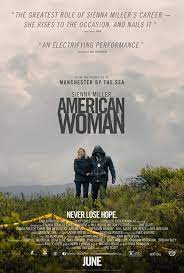
AMERICAN WOMAN
US, 2018, 111 minutes, Colour.
Sienna Miller, Christina Hendricks, Amy Madigan, Aaron Paul, Sky Ferreira, Will Sasso, Pat Healey, Aidan Fiske, E.Roger Mitchell.
Directed by Jake Scott.
This drama has good credentials, direction by Jake Scott, son of director Ridley Scott. The screenplay was written by Brad Inglesby who was to achieve some fame with his writing of the multi-award-winning Mare of Easttown.
This film also has a Pennsylvania setting, a blue-collar town, ordinary American life.
The focus is on Deb, a very fine performance by British Siena Miller as the American Woman, mother at 17, no father in sight, looking after her daughter who has also given birth to a son and his father neglecting to visit.
The film establishes the character of Deb, her relationship with her family, especially a sympathetic older sister played by Christina Hendricks and a mother who antagonises her daughter continually, played by Amy Madigan.
The drama is heightened when Deb’s daughter disappears without trace, despite an effort by the whole town to search for her.
There are several time periods in the film, the film moving from one to another very quickly, with the audience needing to be alert. The clue is in the age of the young boy, Jesse, Deb’s grandson whom she is raising.
There is a sequence some years later, Ray (Pat Healey) living with the family and supporting them – but a controller and ultimately violent who is ousted by Deb. On the other hand, she begins a commerce course, floundering at first, but as the film progresses we see her succeeding, graduating, able to help groups of women with their courses.
There is some hope for Deb when her sister introduces her to, Aaron Paul, and after eight weeks together, they marry, the joyful wedding ceremony, and the aftermath. The film then moves on some years, the audience hoping that all will be well – but a revelation that Chris has been having an affair and Deb demands that he leave. He tries to come back but she is adamant.
At the end, information comes as to the finding of her daughter and other victims of abduction and murder. She wants to interrogate the killer – and the screenplay moves out of words to focus on images and action as she has the interview, the consequences, for herself and Jesse and the rest of the family, and a visit to the burial site.
Ordinary blue-collar Americans – who could be trapped in their lives but who could find ways of moving beyond.
- The title? Deb as representative of American women? The ordinary American woman? Blue-collar Pennsylvania? Small town? Wife/partner? Mother? Grandmother?
- The Pennsylvania setting, the town, houses, workplaces, bars, atmosphere? The musical score?
- The timespan, the various chapters in Deb’s life, the transitions and the ageing of Jesse?
- Deb, Siena Miller’s presence and performance, initial age, having Brigid when she was 17, the absent father, Brigid and Jesse, at home, Brigid supporting her mother, her mother, the affair with a married man (and her later rushing to him, his wife and her ousting Deb)? Her relationship with Kath, older sister, wise advice, support and understanding? Her antagonism towards her mother, insulting her?
- Brigid’s disappearance, Deb’s anguish, going to see Tyler, insulting him, his not knowing her whereabouts, not visiting Jesse? Going to friends, trying to trace her actions? Going to the police, upset, the sympathetic listening? The townspeople all involved in the search?
- The transition to the next phase, Jesse growing up, Ray and his place in the household, severe, demanding, especially when Jesse? Kath disapproving of Ray? Her mother disapproving? The violence in the house, Deb standing up for herself, threatening, evicting him?
- Deb, by herself, getting older, her studies course, not working the computer? The later achievement of her course, graduation? Helping the women’s group in the town, advice, success?
- Kath, setting her up with, the meal with Chris, Deb’s complaint about his clothes, his going to see her at the diner, the date, the bonding, the relationship? Jesse and the relationship? The wedding, after eight weeks, her mother warning her against the wedding? In church, the celebration, Terry’s speech? Happiness all round?
- The years passing, Deb and her accomplishments, business, work? Chris and his work, Jesse and school, dating, the dance, his shyness and reluctance, persuading him to go to the dance?
- Deb, seeing Chris, following him, the six months affair, his leaving? Deb and the decision to sell the house, to move? Chris coming, $15 for the item? Deb not taking him back?
- The detective, the news about the abductions and killings, Deb wanting to interview the killer? The visuals rather than dialogue about this meeting, the aftermath, the effect on Deb? Going to the site, with Jesse, sadness, possible closure?
- The audience following Deb’s life, her angers, unsympathetic, her demands, relationship with her sister, her mother, her grandson, the visit with Tyler and his promise to keep in touch, Chris and his infidelity, her future?
Traditore, Il/ The Traitor
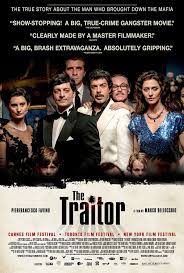
IL TRADITORE/ THE TRAITOR
Italy, 2019, 153 minutes, Colour.
Pierfrancesco Favini, Luigi lo Cascio, Fausto Russo Alesi.
Directed by Marco Bellocchio.
During the 1980s, there was great upheaval in Sicily with an expose of the Cosa Nostra, the Sicilian Mafia, especially as it moved from its traditional financial dealings, drug dealings, to the more destructive trade of heroin.
The centre of this expose was a lifelong member of the Cosa Nostra, Tommaso Buscetti, not a top ranking official but with close connections. He had been arrested and imprisoned several times and had moved to Rio de Janeiro for an easier life. With rivalries amongst the leaders, and a large number of assassinations, including was get Buscetti’s two sons, he decided that he was disillusioned with the way the Mafia was going and would testify to the investigations, led by the prominent judge Falcone.
This film shows initial meetings, the bonds between the Mafia leaders, their socialising, yet the rivalries and a huge succession of vicious assassinations. The film also shows was Buscetti’s life in Brazil.
But the significant part of this long film is the series of discussions between Buscetti and judge Falcone, court sequences, the testimony from Busetti, the large range of Mafia personnel in cages in the court, their defiance, the decision of some of them to cross-examine Buscetti and his contradicting them. Ultimately, many of them received severe sentences.
The film also shows the vengeance of the Mafia with the blowing up of the judge’s car on a freeway and his death. This influence was Buscetti’s return to Italy from Canada, to give further testimony, especially against the capo – who calmly denied all Busceti’s accusations but was found guilty and, at the time of the making of this film, still in prison.
Buscetti died in his sleep in Florida in 2000.
20 years earlier, Ricky Tognazzi made a similar expose film, Falcone, Excellent Cadavers, with Chas Pamentieri as the judge and F. Murray Abraham as Buscetti.
This film is the work of Marco Bellocchio, prominent in direction since 1965 – and the maker of Good Morning, Night, on the abduction and death of Italian politician, Aldo Moro.
- Story? The Italian Mafia pre-1980? The 1980s? Post-the 1980s?
- Palermo, city, hotels, meetings, sites for assassinations? The courts? The sequences in Canada and the United States? The musical score?
- Information about Cosa Nostra, the Mafia, the Corleone families, financial dealings, structures, leaders, soldiers, offering opportunity for work? The introduction of heroine, the change in Mafia dealings?
- The introduction to Tommaso Buscetti? His role in the Mafia, loyal, from a young age, obeying orders, killings, in prison, drug charges? His sons? His wives? Status? His decision to go to Brazil, his life there? The brutal killing of his sons? The effect?
- The decision to return to Italy, the meeting with Falcone, his decision to give information, his disillusionment with the Mafia, the cruelty, the heroine dealings? The scenes of interviews and the information about the Mafia and its workings?
- The status of Judge Falcone, his reputation, interrogations, information, court cases, guilty verdicts? The brutality of the blowing up of his car and assassination? The funeral sequences, the speeches, the effect?
- The rounding up of the Mafia bosses, imprisonment, the numbers, the wide range, leaders, supporters? In the cages during the trial, their behaviour, interjections, permission to smoke…?
- Buscetti, the return, with Falcone, his decisions, his clothes, going to court, his testimonies? The Mafiosi wanting to cross-examine him, the permissions, his answers, their attacks, denials?
- The judgements, the verdicts? The revenge on Falcone, the celebration and callous condemning him by the Mafia?
- Buscetti, relocating in Canada, his life there, his continued friendship with Cornato, his being in the US, the visit, the decision is to return to Italy, testimony, Sicilian language?
- The arrest of Rina, the boss, mastermind, detached, in the stand, his denials, contradicting Buscetti? The judgement against him?
- Buscetti, his life after the trials, in the United States, the finale in Florida, his retirement, age, dying in his sleep?
- The film is a record of the investigation and the Mafia in the 1980s and the consequences?
Lost Daughter, The
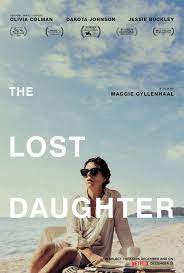
THE LOST DAUGHTER
US, 2021, 121 minutes, Colour.
Olivia Colman, Jesse Buckley, Dakota Johnson, Ed Harris, Peter Sarsgaaard, Dagmara Dominczyk, Paul Mescal, Jack Farthing, Oliver Jackson-Cohen, Panos Koronis, Alexandros Mylonas, Alba Rohrwacher, Nikos Poursanidis.
Directed by Maggie Gyllenhaal.
As the final credits roll, we might be asking who is, out of the many daughters, the lost daughter of the title. Is it all of them? Some of them? All, particularly by the end, the central character, Leda herself?
Maggie Gyllenhaal has proven herself in acting. This is her first film as director and she has written the screenplay as well, adapting a novel by Eleanor Ferante. The film has many award nominations and won for best screenplay in Venice, 2021.
This is a film one has to stay with, patiently sharing the experiences of Leda, wondering about her, who she really is, what her life has been, and gradual revelations – and, an increasing number of flashbacks to her early life, especially scenes with her two daughters as little children. This reviewer found it easy to move into the film because of the presence of Olivia Coleman and her performance. (Olivia Colman has had a strong British career, but came to prominence with her role as Queen Elizabeth in The Queen and her Oscar, as Queen Anne, in The Favourite.)
The audience arrives at a small Greek resort with Leda, settles into her pleasant apartment, helped by expatriate at Lyle (Ed Harris). She goes to the beach. She swims. She makes notes. She goes for walks. And back to the apartment. A quiet holiday.
But then an extended family, Americans and Greeks, arrive and rather take over the small beach. Leda observes, is a touch nasty in refusing to move spot on the beach for the family – and later apologising. She observes, has some conversations, especially with Callie (Dagmara Dominczyk), 42 and pregnant for the first time. And she observes Nina (Dakota Johnson), young, handsome and tough Greek husband, little daughter. Leda is fascinated by the daughter, mother and daughter relationship, the daughter and her little doll. When the little girl goes missing, it is Leda who finds her and restores her to the gratitude of the family – but, for some reason, takes possession of the doll, hiding it, later cleaning it, later buying clothes for it, dressing it.
And, as she observes, her mind goes back. As young she had played by Jessie Buckley, in another fine performance. She remembers her two daughters, her relationship with her husband, her academic and distinguished career, Italian literature, translator, and also analyses of the poetry of W.H.Auden. She is easily irritated by her daughters but then makes up. And there are dolls. An extended flashback takes her to an invitation to a conference, discovering a Professor Peter Sarsgaard, who has read her work and appreciated her insights into the poetry, praising them during his lecture, inviting her to sit next to him at the dinner – and, as we anticipated, an affair but with more drastic consequences.
The screenplay consists of a number of episodes, Lyle and his conversation with Leda, cooking a meal, dancing with her. And she has a conversation with the Irish Will who works on the island during vacations – but who has a secret with Nina. She goes to the cinema and is angry with the noisy young men who enjoy disturbing the audience.
There is some dramatic climax, especially with Nina, with the doll, Leda ending her holiday but disturbed, some reckless driving, lying on the beach (which is how the film opened). It is not all tragic – but, we are left with the portrait of Leda, liking her, sometimes disliking her, definitely not always approving, but wondering whether this holiday, this opportunity for memories and reflection, is something of a catharsis for her – and a phone call with one of her daughters. Her future?
- The title? With reference to leader, to her daughters?
- The Greek island setting, the resort, the hotel, the town, the beaches, the sand on the shore, the shops, the cinema, the Greek countryside? The contrast with the US, homes, academic settings? The musical score?
- The presence of Olivia Coleman? Sympathetic, not always sympathetic? Age 48, the audience not knowing much about her, the initial impressions, arriving, the encounter with Lyle, the accommodation, having a holiday, on the beach, swimming, relaxing? The encounter with the Greek-Americans, their noise, a surly response, the later apology? The growing friendship with Nina, with her little girl, the presence of the doll? Nina and her disappearance, the search, leader finding her, but keeping the doll, in her room, later dressing it, buying the clothes, hiding it? The bonding with Nina, the discussions with Callie and her being pregnant in her 40s, interactions with the men, rowdy, Nina’s husband?
- Lyle, expatriate, friendly, helping leader, offering her the meal, the relationship and not going any further?
- The beginning of the flashbacks, the revelations about leader and her early life, her marriage, her two daughters, her irritation with them, temper, yet love and fostering them? The dolls? Her academic background, translation, the poetry of Auden? The professor and his inviting her to the conference, the encounter with the young professor, his speech, reference to her, the later meetings, his flirtation, the affair, for some years, leaving her daughters and husband? And the later return? Indication of subsequent relationships with her daughters?
- The incident in cinema, the rowdy men, calling the manager, their taunting her?
- The incident in the shop, buying the clothes for the doll? The encounter with the women?
- The discussions with Nina, the friendship with the Irishman, Will, dinner with her, his revealing the relationship with Nina? Asking for her apartment? The challenge to Nina?
- Nina’s visit, the revelation of the doll, the subsequent tensions?
- Leader, deciding to go home, going to the water and collapsing, the scene actually beginning the film and the rest flashback? What recovery? What future? Reconciliations or not?
Dirt Music
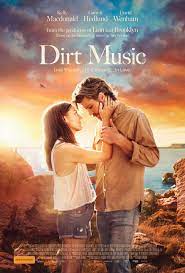
DIRT MUSIC
Australia/UK, 2020, 105 minutes, Colour.
Kelly Macdonald, Garrett Hedlund, David Wenham, Aaron Pedersen, Dan Wylie, Chris Haywood, Julius Stone, Ava Caryofyllis, Syd Brisbane, George Mason.
Directed by Gregor Jordan.
This is a screen version of the novel by one of Australia’s prominent novelists, Tim Winton (That Eye, The Sky and In the Winter Dark during the 1990s, a television adaptation of Cloudstreet, the anthology of The Turning, Breath).
The film was directed by Gregor Jordan, Two Hands and Ned Kelly. However, the film was not well received, considered too cold, even uninteresting. Which is a pity because there is a very strong cast led by Kelly MacDonald and a range of Australian character actors.
The setting is Tim Winton’s Western Australia, some harsh coastal and desert landscapes. The focus is on an unhappy marriage, the wife looking beyond her husband, falling in love with a former musician, his reluctance, then acceptance of the relationship, his escaping into the desert and the wife pursuing him, building up to a final confrontation.
The title is arresting – perhaps a mixture of the career of the musician and his fleeing to the desert.
- The novels of Tim Winton? Screen adaptations? The title, music, the soil?
- The Western Australian settings, the coast, the water, the beaches, cliffs, the islands and inlets, the town, the visit to Perth? The musical score? Songs?
- Georgie’s story? Her background, separation from her family, the death of her mother, summoned by her sister? The confrontation with her father, his past behaviour, causing an upset at the wake? Her relationship with Jim, over the years, his boys and acting as mother to them? The story of her approaching Jim, the relationship? The years passing, her isolation, distance? Helping Jim with the fishing, her work as a nurse and the injured man?
- The encounter with Lou? Swimming, the boat, his stealing? Leaving Jim, the cars breakdown, the lift from blue, the hotel, the sexual relationship? At his place? Gradually revealing their stories?
- Lu, a man haunted with memories, his brother and his wife, her relationship, the little girl, his devotion? Memories of their deaths? His blaming himself? The past and his musical career? The importance of the family locally, his father? His poaching and the antagonism of the fisherman? The relationship with Georgie? His decision to move, packing, going north, getting lifts, the plane and the pilot, going to the island, life in isolation, fishing? His injuries?
- Georgie, discussions with Jim, the decision to leave? His decision to help her find Lu? The travel, in the plane, the pilot, the guide and his advice about the islands? Georgie and the boat, the search of the island, finding Lu’s hut, calling for him, amplifying the music? The decision to leave?
- Lu, injured, hearing the music, struggling to the beach? The plane leaving?
- The final image, Lu and Georgie together on the beach?
1982

1982
Lebanon, 2019, 100 minutes, Colour.
Mohamad Dalli, Fidel Badran, Gia Madi, Ghassan Maalouf, Lielya Harkous, Nadine Labaki, Said Serhan, Aliya Khalidi, Rodrigue Sleiman, Alastair Brett.
Directed by Oualid Mouaness.
“On June 6, 1982, exactly 38 years after D-Day, roughly 60,000 Israeli troops and more than 800 tanks, heavily supported by aircraft, attack helicopters, artillery, and missile boats invaded Southern Lebanon, a country already involved in a decades-long civil war. Israel's publicly-stated objective was to push PLO (Palestine Liberation Organization) forces back 40 kilometers (25 miles) to the north and establish an expanded security zone that would put northern Israel out of range of the continuing onslaught of PLO rockets.”
This is a memoir, almost 40 years after the events.
This narrative has a double focus, on children at school, on adults, especially the teachers at the school, their various affiliations, conflicts, effects on emotional relationships.
The action takes place mainly in and around the school, the bombardment seen in the distance. However, the film immerses its audience in the feelings of the time, and especially with the experience of the children, at school, their backgrounds, and the expected consequences of the Israeli invasion.
This film takes his place among a number of films dramatising the war in Lebanon on, the Civil War, the Israeli attacks.
- A heartfelt Lebanese film? The experience of war, civil war, religious conflict, invasion and bombardment by the Israel? And the focus on a day in 1982?
- The significance of 1982 in Lebanese history? Attacks from Israel? Bombardments in Beirut? The divided city and movement between sections? The experience of war?
- 1982, Beirut, the school, the students, their backgrounds, the teachers, the administration? Audience responding to the ordinary detail of school, the students gathering, parents and family, friendships, classes, recreation periods, the groupings? The work of the teachers?
- Listening to the news, the information about the attacks, seeing the smoke in the bombardments, looking across the city? Decisions to be made by the administration? The reaction of the students, the teachers and their role, keeping the students calm? Eventually the students having to go home, organisation of the parents, the cars, buses, students from the other side of Beirut?
- The focus on Wissam, his age, family background, his friendship with Majid, their talking, his infatuation with Joanna, his drawings, the superheroes, leaving the note for Joanna? In class, competitive with their studies and exams, his awkwardness in talking? The film highlighting his focus on Joanna, obsessing?
- Joanna, new to the school, her background, her talents, in class? Receiving the drawing, curious? Her friendship with Abir, from the other side of the city? Time together, talking, the puzzle about the drawing?
- Majid, mischievous, his glasses, the friendship with Wissam, clashes, reconciliation?
- The portrait of the other students, in the detail of the school, with Wissam, with Joanna?
- Yasmine and her story, her role of the school, encouragement of the students? The home background, family? Trying to keep in contact by phone through the day? The discussion with her brother, his decision to go to the south of Lebanon on, his involvement in the uprising? Her continued concern? Her friendship with Joseph, discussions with him, the cooling of the relationship, his political opinions? The birth being involved in getting the children to safety?
- The principal, the work, interviews, decisions?
- The end of the day, the cars and parents, the children being picked up, the hiring of the bus, the driver, his exasperation, Wissam and his relationship with his older brother and his girlfriend, in the bus, his getting out, wanting to go to the toilet, seeking out Joanna, getting onto the bus? Joanna and her leaving Abir? Wissam almost missing the bus?
- A memoir, almost 40 years later, yet bringing this and a to life, bringing the experience of war in Beirut to life?
Devil Has a Name. The
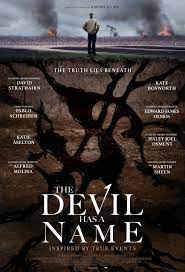
THE DEVIL HAS A NAME
US, 2019, 97 minutes, Colour.
Kate Bosworth, David Strathaiarn, Martin Sheen, Edward James Olmos, Alfred Molina, Rob Moran, or Pablo Schreiber, Kathleen Quinlan, Haley Joel Osment, Katie Aselton.
Directed by Edward James Olmos.
This is a film about industrial pollution, specifically oil companies and the residues from their processes, the contamination of farmers’ subsoil water. We are in something of Erin Brockovich causes.
However, there is more focus on the company, presided over by Alfred Molina, a smug CEO with no moral conscience. A young woman, Gigi, tough Kate Bosworth, an executive in the company, is called to give an account of an operation that seems to have gone wrong. The audience with the executives forms the framework of the drama, her flashback narration of the events and her interpretation.
The film is something for a star vehicle for David Strathairn, veteran of many films and character performances over the decades. He is a local farmer, working with his Hispanic foreman, Santi, Edward James Olmos, for 30 years. (The cause must be important for Olmos as he has also directed the film.)
There are double dealings throughout the film, especially with the members of the oil company, language about the devil and deals. Chief amongst these is Pablo Schreiber as an ambitious and unscrupulous outsider Ezekiel, who wants in. Someone who is used by both Gigi and Ezekiel is a go getting young man, Alex, played by Haley Joel Osment.
The film becomes something of a court case drama with Martin Sheen as the prosecuting lawyer, a man with a solid reputation and integrity.
When the case is almost lost, there is some wheeling and dealing, Gigi, becoming more dependent on alcohol, outwitting Ezekiel and giving testimony in the case that condemns the company – working on the principle that it is cheaper for things to keep going as they are and pay off any situations arising.
The film does not have the dramatic excitement of Erin Brockovich but is a contribution to the continued consciousness of the need for environmental protection in the United States.
- The title, good and evil, capitalistic business, diabolical plans and execution?
- Texas and California, Houston and offices, the Central Valley of California, crops of fruit and nuts, oil companies, stagnant pools, water poisoning, the effect on farmers? Legislation, court cases, decisions?
- The framework of the film, Gigi and her being summoned, disliked, the confrontation with the three bosses, a narrative of her behaviour, Fred Stearns and his case, her own participation, her gradual domination, challenge to the boss, his standing down, her taking over?
- Fred Stearns, his farm, fruit and nuts, hitting his golf ball, 30 years of working with Santi, the visualising of the poison, the oil drops in the water, contamination of the water, the pools? The threat to Fred? Support of Santi, his anarchist ideas?
- Shore Oil, the approach, Gigi and her executive role, her contact with Alex, persuading him to do the persuasion, her being in the background? The presence of Ezekiel, his influence, plots, getting Alex on his side? Her drinking more? Her seeming defeat? Her obsession with her carpet? The challenge to Ezekiel, Battle of wits? The deal with Fred, her giving testimony, denouncing the company? Confronting Ezekiel, shooting him, his shock, his being buried under the earth works? Her return to Houston? Telling her story, her winning out in the end?
- Fred, age, the death of his wife, her paintings, the hopes for the yacht and sailing around the world? The visit with Alex, the meal, Santi and his scepticism? Fred and the $50,000, talking about $70,000? His change of heart? His visit to Ralph?
- Ralph, legal background, reputation, dragonslayer? The discussions with Fred, the challenge as to whether he wanted money? Taking on the case? His performance in the court, Time out at the toilet, his questions, Alex and his arrogant behaviour and answers? The defence lawyer and her stances? Becoming disillusioned with Fred, Fred and his plea and apology, the question for Gigi? In court, Ralph not quite knowing what it happened? Fred and his gift of the statue of the Eiffel Tower?
- Ezekiel, his personality, intruding into Fred’s home, his stammer, then his real colours, the threats, his plans, the bosses in Houston, the nightclub sequences, the clashes with Gigi, discovering Alex, the gun, having power over him? Gigi finally confronting Ezekiel, wits, shooting him, his being buried in the rubble?
- Alex, go-getter, turncoat, fears, his arrogant answers in court, Gigi and her answers, his anger, erupting, the arrest?
- The sequel, setting up the situation with Santi, the fight, recording it, illegal immigrant, in prison? Fred’s visit, the tension?
- The case in Fred’s favour, public opinion? The yacht, sailing, Santi joining him?
- The epilogue, the situation with oil and contamination continuing?
Wedding Guest, The
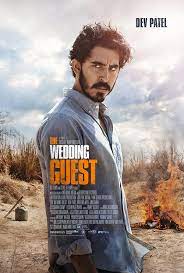
THE WEDDING GUEST
UK, 20 1918, 96 minutes, Colour credit of the.
Dev Patel, Radhika Apte, Jim Sarbh.
Directed by Michael Winterbottom.
The Wedding Guest is a brief melodramatic drama full of local subcontinent colour. It is been written and directed by veteran, Michael Winterbottom, whose work includes a range of quite varied dramas and documentaries.
Dev Patel (Slum Dog Millionaire, Best Exotic Marigold Hotel, David Copperfied, Lion…) Packs his bags, flies to Pakistan on a mission. He has been commissioned to abduct a young woman from a forced marriage, reunite her with her boyfriend who is paying for the mission.
On the one hand, the film is continually surprising in its detailed look at the towns and cities of Pakistan and India, the range of countryside. On the other hand, the focus is on Jay, his intensity, his commitment to his mission, the death of a security guard, trying to make contact with the man who commissioned the abduction. In the meantime, he gets to know the young woman and her stances – a modern young woman who does not want to be trapped in an arranged marriage.
There are various disruptions to the plan but, ultimately, Jay has to make a decision about returning Samira to Pakistan. It is her wish never to return. There are further dramatic complications, especially the man who organised the mission and his going back on his word, leading to his death, his body being burned and buried in the desert.
Which brings the couple together, a seemingly inevitable relationship – but, the been many indications that Samira is not necessarily to be trusted and, while she does escape, she phones Jay, leaves him enough money – for what?
- The title, the irony is? The forced wedding, Jay and his intervention?
- Sequences in the UK, Jay packing, airport, Pakistan, the location photography, in the streets, the countryside, the atmosphere? Transition to India? Amritsar, Delhi, hotels, streets, cafes? The countryside, desolate? The musical score?
- Jay, his personality, not knowing much about him, his packing, his mission, Pakistan, his plan, techniques, hiring the cars, making the connections, the discussions with the boy, scouting out the house, the intrusion, taking Samira, gagging her, the escape, the encounter with the security guard, shooting him?
- The details of the plan, vehicles, accommodation, security on Samira, her seeming the victim? Phone calls, Deepesh, change of plans, finally meeting him, the money, his hesitations? Newspaper reports of the killing? His wanting Jay to take Samira back to Pakistan?
- Samira, her character, England, returning to Pakistan, the arranged marriage? Her decision, not wanting to be married? Collaboration with Jay, the money, demanding to meet Deepesh, the issue of the jewels? The meeting, the drive, Deepesh and his attitude, Jay rescuing Samira? The confrontation, the fight, killing Deepesh, the dilemma, Samira guarding the body, Jay getting the tools, burning the body, the burial?
- The decision, to travel to the resort, going to the jewellers, trying to sell the diamond, failure? The growing relationship between the two? The effect on Jay?
- Samira leaving, the phone call, the diamonds, leaving Jay the money?
- Jay, in India, his past, his future?
Where'd You Go, Bernadette?
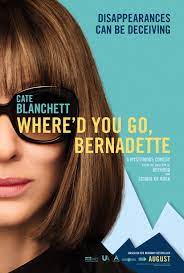
WHERE’D YOU GO, BERNADETTE?
US, 2019, one 109 minutes, Colour.
Cate Blanchett, Billy Crudup, Emma Nelson, Kristin Wiig, Zoe Chao, Lee Harrington, David Paymer, Megan Mullaly, Laurence Fishburne, Steve Zahn, Patrick Jordan, Kate Burton, Judy Greer, James Urbaniak.
Directed by Richard Linklater.
The quick answer is Antarctica! However, Bernadette has withdrawn from real life, into herself, agoraphobic, into her home.
The film is an adaptation of a novel by Maria Sample, quite complex plot. It is been co-written and directed by Richard Linklater, a significant contributor to different American films over 30 or more years, from Slacker to the Before… Trilogy, two experimental Boyhood.
The film was also a star vehicle for Cate Blanchett as the bewildered Bernadette, once a talented architect, suffering from agoraphobia, close to her daughter, Bee, Emma Nelson. Billy Crudup is her bewildered husband, Kristin Wiig is a neighbour, Audrey, with whom Bernadette is continually clashing but who, surprisingly, reconciles and helps Bernadette on her mission to Antarctica.
There is a strong supporting cast, representing authorities who are trying to diagnose and prescribe for Bernadette.
When it is decided that Bernadette should go to an institution while Bee and her father travel to Antarctica, Bernadette escapes, gets the help of her neighbour, Audrey, who arranges the flight to Antarctica. Needless to say there are surprises all round, Bernadette and her experience of Antarctica, friendship with some of the crew, the shock of husband and daughter finding Bernadette there.
As regards the title and where Bernadette went, there is some final irony for the agoraphobic Bernadette as she finds she can contribute her architectural skills to designing some of the plant in Antarctica.
An unexpected offbeat entertainment, and somewhat unexpected from Richard Linklater.
- The title, arresting, the question, the focus on Bernadette?
- The Seattle setting, America’s north-west? The city, the views, the rain? Homes? Universities and research? The emphasis on architecture, the buildings, designs? Art? The musical score?
- The present, Bernadette and Elgie, 20 years of marriage, taking each other for granted? Edge? The relationship with Bee? Her age? Devotion to her mother, attitude towards her father? The home situation, the layout of the home and its design? Elgie and his work, inventions, patents? Travel, lecturing? The contrast with Bernadette, at home, memories of her past, architectural skill, competition, hopes and ambitions? Ambitions thwarted? Marriage, and life, absolute devotion to her daughter?
- The visualising of the past, Bernadette and Elgie? His abilities and success? Her promise and ambitions? The variety of buildings, their being brought, pulldown? The effect?
- The video about her, Bee watching it, the range of testimonies from friends and experts (and the cameos by guest stars)? Bernadette watching it?
- Bernadette, introversion, avoiding people, staying in the house? Yet going to restaurants, the meals with Elgie? The meal with Paul Jellinek, their past, his supporting her, her pouring out her feelings about herself?
- Bernadette, acerbic with other people, critical? Cantankerous with Audrey? At school, running over Audrey’s foot? Audrey and her attitude towards the neighbourhood, her son and his drugs? The issue of the blackberries, the garden, the removal, the strategy? Bernadette and her malicious intentions? Audrey and the party, all the guests, the celebration, her speech, the subsiding of the hillside, the flooding into her house?
- Bee, her age, precocious, studies? At school? Friends? The possibility of the trip to Antarctica? Her parents discussing it? The agreement to go? Yet Bernadette not wanting to go?
- Bernadette more agoraphobic? Prescription drugs, going to the pharmacy, the discussion and argument? Elgie looking at her cupboard, the taking of the drugs?
- Bernadette in the house, the recording of her emails to Manjula, India, the range of purchases?
- Dr Kurtz, her visit to Elgie, explanation of the situation? The FBI agent? The scam, the financial difficulties? The meeting with Bernadette, the frank presentation of the truth? Bernadette’s upset, escaping out the window, taking refuge with Audrey, reconciling with her, Audrey taking her to the airport?
- Bernadette going to Antarctica, the experience, the canoe, the discussions with the science personnel? Joining them?
- Elgie and Bee, Elgie selling his patent, flying to Antarctica, the ship, trying to find Bernadette, officialdom thwarting them? Eventually tracking her down, finding her, listening in to her?
- Bernadette, the discussion with the authorities, wanting to go to the South Pole, the prospect of designing the base, the arguments, the authorities googling her, giving her the opportunity? Her finding Elgie and be, explaining everything to them, their hearing it, the reconciliation?
- Bernadette, the chaos of her life, her artistic temperament, its being crushed, not finding outlets, creativity as a solution to her fears and mental condition?
- On reflection, the meaning of the title and its questions, what happened to Bernadette? Her future?
Pearl in the Mist/ VC Andrews Pearl in the Mist
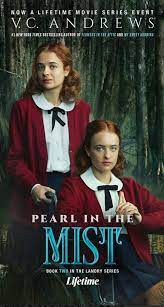
PEARL IN THE MIST/ V.C.ANDREWS PEARL IN THE MIST
US, 2021, 87 minutes, Colour.
Raechelle Banno, Karina Banno, Richard Harmon, Ty Wood, Lauralee Bell, Glynis Davies, D or arien Martin, Marilu Henner Sage Linder.
Directed by David Bercovici Artieda.
This is a film for those who enjoy rather heated melodramas, produced by such companies as Lifetime. It is the second in a four-part series of films focusing on the Landry family.
The setting is the South, all kinds of dynasty complications, the family of the rich manner, the poor relations out in the countryside, characters moving from one world to another. There are quite some emotional complications in the background of the family, affairs, cousins, cousins falling in love without realising the relationship…
There is a certain compulsion in responding to these stories which may seem rather preposterous when recounted.
At the centre of these films are two sisters, played by Australian twins, Raechelle and Karina Banno.
A note of caution! In watching them, you may inevitably be drawn into watch the other episodes in the saga.
- The popularity of the Landry series? This second in the series?
- The Louisiana settings, wealthy families and mansions, aristocratic schools, scenes in the bayous? The musical score?
- The early 1960s, the south, arrogance, racism? Moral behaviour? External morality? Propriety?
- Ruby’s story continuing? The background of her upbringing, relationship with her parents, sister, grandmother? Coming to the house, greeted by her father, the severity of her mother, her sister in the wheelchair, blaming Ruby? Going to the school?
- The school, the severity of the principal, her speech, demands, punishments, stern interviews? Snobbery?
- Ruby, free spirit, her relationship with Beau? Gisele and her jealousy? The principal speech, Gisele’s comments? Sharing rooms? Abby, secret, mixed race, expelled from school? The secret, Gisele’s curiosity? Gisele searching her room, finding out the truth, exposing Abby at the dance?
- The visit to the Clairbourne house, Ruby and the paintings, wandering, discovering Louis, playing the piano? Her being invited again, the encounters with Louis, his telling the story of his mother, the father and his smothering his mother, her affair, the flashbacks visualising this? Louis, the kiss, Ruby’s reaction, his walking out? The further invitation? Louis being able to see better, the bonding with Ruby?
- Buck, the handyman, Ruby seeing him, the rules about after dark, the accusations against Ruby, the witnesses, Gisele and her behaviour? His being sacked?
- Gisele and her recovery and manifestation?
- Beau, the visits, the sexual encounter, the pregnancy, her being sick? The reports, sent away, her mother in the interview, the planned abortion, Ruby refusing, going to the bar you, the help from Paul, the storm, the birth of the baby, calling the baby Pearl? Her future?
- The sudden news of the death of their father, the mother’s reaction, her reliance on the lawyer, announcing her engagement? The uncle, his being interned, out of his room, into the ward? The mother and her threatening Ruby about the will? The final encounter with Beau, his going to France? Gisele’s letter and news?
- The portrait of the school, the severity of the principal, the range of girls, Gisele and the girl as her servant, the contrast with Abby? The dance, the boys, not dancing with Abby, the announcement of the Queen, Abby’s speech and departure?
- This film is an interim chapter in the saga?
Spiderman: No Way Home
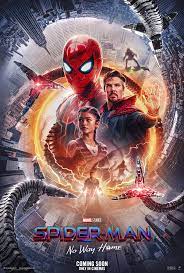
SPIDERMAN: NO WAY HOME
US, 21, 148 minutes, Colour.
Tom Holland, Benedict Cumberbatch, Zendaya, Jacob Batalon, Jon Favreau, Jamie Foxx, Willem Dafoe, Alfred Molina, Rhys Ifans, Thomas Hayden Church, Benedict Wong, Tony Revolori, Marisa Tomei, Angourie Rice, Andrew Garfield, Toby Maguire.
Directed by Jon Watts.
Sitting in the cinema, waiting for Spiderman to begin, it was intriguing that there on the screen was a request to respect not revealing spoilers. As the film went on, this reviewer was very glad that he had not heard any spoilers, was able to be amazed, continually, at the unexpected plot developments. So, a reinforcement of the exhortation not to reveal the plot. Which, of course, makes it very difficult to write a review!
And what is it about? As Dr Strange says: it is the grand calculus of the multiverse! Just what we would have thought!
Where does Spiderman stand in the Marvel Universe? In fact, he has been very popular, some television movies in earlier decades, but, for the last 20 years, eight feature films and the animated story of the Spiderverse, with multiple Spiderman in parallel dimensions. Three films with Toby Maguire. Two films with Andrew Garfield. This is the third film with the present Spiderman, Peter Parker, Tom Holland (and directed with great energy by Jon Watts). And then the news came, on its release in the US and around the world, that it had the third biggest opening of any film! How could a more modest Spiderman film achieve this? It would be a spoiler to say anything more!
But, we can say that this is not just a Spiderman superhero adventure. It is a Dr Strange story, following on his own film, with Benedict Cumberbatch in the central role and Benedict Wong as his assistant. It is a bit of a stretch to bring Dr Strange into Spiderman’s New York, but as the film opens, following immediately on the previous film, the villain Mysterio (Jake Gyllenhaal) reveals Peter Parker’s identity on television. Gloating on this revelation is the shock jock television journalist played by J.K.Simmons, denouncing Peter Parker as public enemy number one.
And this has an effect on his close friends, MJ (Zendaya) and Ned (Jacob Batalon) as well as Aunt May (Marisa Tomei) and her boyfriend, Happy (Jon Favreau). A welcome return by all of these characters.
What can be revealed and is not a spoiler is that Peter is desperate that people not know that he is Spiderman, making a plea with Dr Strange that he cast a spell so that people will forget who Peter really is. That would been very simple but, during the spell and the hocus-pocus which Benedict Cumberbatch can do with such aplomb, plus special effects, Peter starts thinking of all those that he would like to keep remembering him, his friends, Aunt May… Which rather spoils the effect of the spell.
The screenwriters must have enjoyed themselves thoroughly in working out what could be some of the consequences of this spell gone wrong. And we enjoy ourselves as we continue to discover what the screenwriters have cooked up.
It does mean that there are a lot of adventures, fights, special effects galore (plus galore), which makes for continually exciting and unpredictable adventure. Which continues for the best part of 2 ½ hours! (And, as usual, in the Marvel Movies, end credit sequences, Venom turning up to no obvious purpose but a joke, and a final preview, extensive, of the next Dr Strange adventure.) One always has to stay until the end of the Marvel Movie’s credits.
The film has a strong supporting cast, some of the veterans perhaps surprised by getting a call back. But, it all works very well – and the word-of-mouth (one hopes without spoiler alerts) must have been instantly strong for this Spiderman film to be so successful. And it is.
- The continued popularity of Spiderman, the comics, the television films, the series with Toby Maguire, the two films with Andrew Garfield, the three films with Tom Holland, the animated Spiderverse?
- The continuity with the earlier films, Mysterio and his denunciation of Peter Parker, the public knowing who Spiderman was, the denunciations by J. Jonah Jamison? Leaving him Public Enemy Number One? The effect on the public? Suspicions of Peter Parker, of Spiderman?
- Tom Holland as Peter Parker, age, background, exploits, relationship with Aunt May, with Happy, the discussions with them, reliance on them, Aunt May and her support, with great power goes great responsibility?
- Peter Parker, his relationship with his MJ, her reaction to the exposure, flying her around the city for escape? Her continued support? Ned Leeds, the friendship, sharing in the adventures? The other students at school, their responses, Betsy and her selling the newspaper?
- This as a Dr Strange film, his background, Benedict Cumberbatch, his appearance, costume, the encounter with Benedict Wong, his dealings with Peter, the plan for casting the spell, that everyone forget, Peter and his continued interruptions, the spell going awry?
- The consequences of the spell, the villains coming back from the past films, the character actors and renewing their performances, Alfred Molina and his sinister presence, Willem Dafoe and his pretences, seeming friendly, then villainous, Thomas Hayden Church, Jamie Foxx.? Their stories, their bewilderments coming from the past, from another universe? The interactions with Peter Parker? The whole range of battles?
- The consequences of the spell, the previous Spiderman appearing, the enjoyment of seeing Toby Maguire, Andrew Garfield and Tom Holland working together, the conversations, interactions, memories of the past? There are also having to confront the villains from the past? The battles?
- The mind of the villains, to be their better selves, the mutual help, yet the background of their villainy continuing?
- The continued event interventions of J. Jonah Jamison – and his ultimate comeuppance?
- The Statue of Liberty, the involvement of the characters, dangers, fights, rescues?
- The return of Dr Strange, his bewilderment, his interventions?
- The credits sequence, the appearance of Venom? The trailer for the new Dr Strange film?